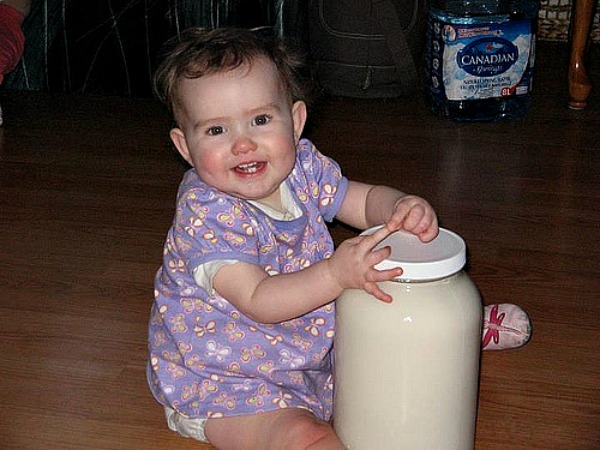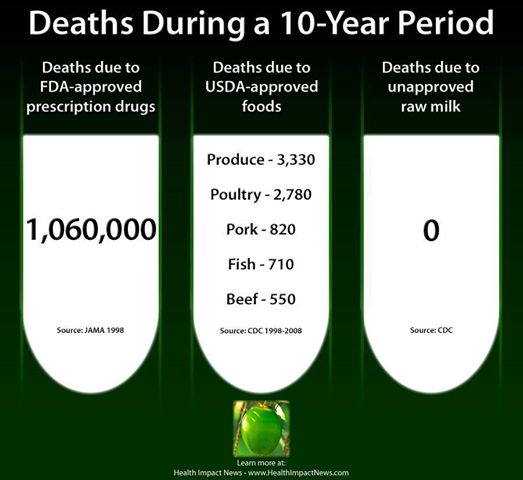 When I was first introduced to the benefits of raw milk nearly 20 years ago, I was newly pregnant with my second child. While I wanted to reap the benefits of this nutrient dense food, I was initially cautious to begin consuming it for fear it might harm my baby.
When I was first introduced to the benefits of raw milk nearly 20 years ago, I was newly pregnant with my second child. While I wanted to reap the benefits of this nutrient dense food, I was initially cautious to begin consuming it for fear it might harm my baby.
Everywhere I turned for research and information about the safety of raw milk during pregnancy was negative.
Numerous citations and sources I reviewed warned against consuming raw milk during pregnancy due to the risk of infection with Listeria monocytogenes, a deadly pathogen that can cause fetal death or premature birth.
While the research I uncovered contained dire warnings about infection with Listeria during pregnancy, I couldn’t actually find documentation about anyone who had actually contracted it from drinking raw milk let alone died or miscarried from it!
After much reading and thought, I concluded that the warnings against raw milk were unwarranted and the nutritional benefits to myself and my child vastly outweighed any risk.
I began to consume raw milk along with aged raw cheese, raw cream and raw butter late in the first trimester of my second pregnancy. I continued this practice throughout my second and third pregnancy with no ill effects. Both children were born healthy, full term and a normal weight.
Why Does the FDA Warn Against Raw Milk During Pregnancy?
In the 12 years since I began consuming raw milk while newly pregnant, the nonexistence of infection with Listeria monocytogenes for raw milk drinkers has continued. Analysis of Centers for Disease Control data on raw milk outbreaks listed no cases whatsoever of food-borne illness from raw milk caused by Listeria during the entire 13 year period from 1993-2005.
 On the other hand, there have been hundreds of illnesses from Listeria contracted from eating deli meats according to a 2003 USDA/FDA report.
On the other hand, there have been hundreds of illnesses from Listeria contracted from eating deli meats according to a 2003 USDA/FDA report.
In addition, 147 people across 28 states contracted listeriosis in 2011 from cantaloupes. 33 people died as a result of this outbreak and 1 pregnant woman miscarried.
Even pasteurized milk and cheese carries the very real risk of listeriosis. From 1998-2012, there were 50 illnesses and 10 deaths (1 fetus) from Listeria contracted from consuming pasteurized milk and cheese in the United States.
Are formal warnings issued to pregnant women regarding the dangers of eating deli meats, pasteurized milk and cheese or cantaloupes while pregnant?
No.
The FDA clearly has a double standard when it warns against consumption of raw milk during pregnancy when no cases or deaths of listeriosis are recorded and yet many have occurred for other foods.
The Dairy That Should be Avoided During Pregnancy
A very real risk of Listeria during pregnancy comes from soft, unaged cheese – both raw and pasteurized.
In Europe, there were 4 deaths from pasteurized soft cheese in 2009. There have also been a number of illnesses and miscarriages from Mexican style cheese made from raw milk including a few in my home state of Florida. This cheese is sometimes referred to as “bathtub cheese”.
If you are pregnant, it is wise to avoid soft, unaged cheeses of all kinds due to the very real risk of Listeria. However, grassfed, raw milk is safe as are aged raw cheeses, raw cream, and raw butter.
Sarah, The Healthy Home Economist
Sources:
Those Pathogens, What You Should Know
Multistate Outbreak of Listeriosis Linked to Whole Cantaloupes
The Nourishing Traditions Book of Baby and Child Care
Zero Deaths from Raw Milk, Health Impact News








I milk my own goats and make my own cheese, mostly soft bag cheeses. Should my own soft cheeses still be avoided if I get pregnant? Thanks!
Sarah, I’ve been doing a lot of research on milk and all I can find is that all milk is mucus forming . What’s your opinion on this?
Actually, we ARE warned about deli meats – and I don’t eat them (without cooking them again) while pregnant. But I do drink my raw milk. 😉
I hear you, though, on the double standard! It’s an obvious intent to vilify a wholesome food.
Kudos for pointing to the dichotomy between the CDC’s official statistics and official warnings. The important thing for people to understand, whether it concerns raw milk, vaccines, or any other subject, is that studies and statistics can be shaped to produce ANY desired result. Applying a bit of common sense is essential. It is politics, not safety, that drives the debate about raw milk, and most other things proclaimed as ‘science’.
For centuries, all around the world, people consumed (and still consume) unprocessed milk, with no refrigeration, no running water, and much lower standards of cleanliness – completely without fear of illness or death. Maybe their practices were an exception, but my mother warns I would be horrified at the level of uncleanliness that was tolerated in her day growing up on the farm.
It was only when factory farming was introduced, with cows being kept indoors, wallowing in their own manure, and fed distillery waste, grain and who knows what else, that milk in America became suddenly ‘dangerous’ for consumption. Research also reveals other unsavory practices, such as city milk deliverers dipping into public horse watering troughs to water down the milk. (You didn’t think profit driven injustices only happen today?) Nor have I ever seen discussed the fact that antibiotics and vaccines were introduced into circulation at about the same time that milk became ‘dangerous’. There was limited, if any, understanding of the immune functions of the gut or the need to keep the proper balance of bacteria.
Using logic (as well as genuine modern research) one must conclude that any risk to unprocessed milk has to do with the unnatural and unhealthy environment of the cows and/or the improper handling of the milk. I would certainly never consume raw factory farmed milk; but then, I wouldn’t consume their inferior and unhealthy product after they attempt to sterilize the nasties out of it.
The facts do not back up the rhetoric concerning raw milk, and independent research will reveal why the same raw milk that is so ‘risky’ in America is safely sold in vending machines across Europe.
Wonderful, informative article. Nice find on the chart as well. The chart really spelled it out with impact.
I am writing to ask why ANY raw milk soft cheese is dangerous.
Are you talking about cheese like ricotta and mozzarella? Please explain why this would be dangerous, as I don’t know and thought these were safe as long as they are handled in a sterile way and always refrigerated. Thank you!
Thanks so much! I’m going to forward this to my dad, a medical doctor, who thinks giving my child raw milk is liken to child abuse!
we drank it all the time.
It isnt sold in stores…not that i know of. You need to go to a farm to buy it.